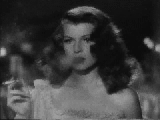

Venus Xtravaganza, one
of the pre-operative male to female transsexuals in "Paris Is Burning,"
states demurely, "I would like to be a spoiled rich
white girl. They get
what they want, whenever they want it ." Her desire to identify
with and
become a "spoiled rich white girl" is problematized by the fact that she
is a poor Latino male sex worker who hires herself out for dates in order
to afford shoes. Venus's desire to be "the impossible" is an instance in
which the political directly factors into identification-formation,
contrary to Freud's analysis which does not account for power dynamics or
experiences based on race and class. Race, class and sexual orientation
inflect psychoanalytic processes, or as Judith Butler suggests, bodies
matter. In the context of the film, bodies matter very much: by the
end, Venus has been killed by a male escort, probably because he found out
that her gender did not correspond with her anatomical sex. When Venus
says, "I want a car. I want to be with the man I love. I want a nice
home. I want my sex change. I want to be a complete woman," processes
of identification kill her.
"Paris Is Burning" is a documentary about drag as a vehicle for
"realness"
which is measured against white upper-class heteronormativity. Drag
queens, transsexuals, and cross-dressers participate in a New York gay
subculture by belonging to "houses" or "gay street gangs" which enables
them to "walk at Balls" or cross-dress, not only as women but also as
executives, military officers, and polo players. Filmed by Jennie Livingston,
a white, middle-class lesbian, the documentary alternates between
framing characters who critique the desire to be "real," and framing
characters who revel in their "realness." As Brooke Xtravaganza (from the
house of Xtravaganza), a black post-operative male to female transsexual
notes, "America is nice. You can do what you want if you have money. You
can be what you want--look at me." The camera then follows the giggling
Brooke as she runs around the beach in a revealing swimsuit. As a friend
notes, however, Brooke's laugh still sounds like a man's laugh. But
Brooke can pass, she is real: now she experiences life as a heterosexual
black woman rather than as a gay black man. Identification with
biological heterosexual women, in Brooke's and Venus's case, is a way
"out," as it were.